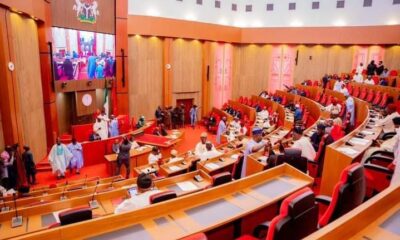NEWS
Tax Reforms Not Aimed At Impoverishing Any Part Of Nigeria, Scrapping Agencies – Presidency

The transformative tax bill before the National Assembly is not aimed at impoverishing any part of Nigeria, neither will it be scrapping certain government agencies.
The Presidency, made the clarification in a statehouse statement issue on his verified social media handles Monday night, Special Adviser to the President (Information & Strategy), Bayo Onanuga.
Onanuga wrote, “Since the public debate around the transformative tax bills before the National Assembly began in the last few weeks, various political actors and commentators have tried to obfuscate the facts, deliberately misinforming and misleading the public.
“Unfortunately, most reactions are not grounded in facts, reality, or sufficient knowledge of the bills. While some commentators have attempted to incite the people against lawmakers, others have polarized one section of the country against another.
ALSO READ: Tinubu, Ramphosa Co-Chair Bi-National Commission’s 11th Session
“The tax reform bills will not make Lagos or Rivers more affluent and other parts of the country, as recklessly canvassed, poorer. The bills will not destroy the economy of any section of the country. Instead, they aim to enhance the quality of life for Nigerians, especially the disadvantaged, who are trying to make a living.
“Contrary to the lies being peddled, the bills do not suggest that NASENI, TETFUND, and NITDA will cease to exist in 2029 after the passage of the bills.
“Government agencies, such as NASENI, TETFUND, and NITDA, are funded through budgetary provisions with company income tax and other taxes paid by the same businesses that are being overburdened with the special taxes.
“One reason President Bola Tinubu embarked on the Tax and Fiscal Policy Reforms is the need to streamline tax administration in Nigeria and make the operating environment conducive for businesses.
“For decades, businesses, investors, and private sector players in Nigeria have complained of being overburdened by a myriad of taxes and levies, including those earmarked to fund various government agencies and initiatives.
“The multiple taxes complicate the economic environment, making Nigeria uncompetitive for investment and preventing many businesses from growing or continuing their operations. Some companies have had to make the rational decision to relocate to other countries. We can not continue on this path or wait for 20 years if this country is to deliver the prosperity we need for our people.
“The proposal, as contained in section 59(3) of the Nigeria Tax Bill, only seeks to consolidate some of the earmarked taxes imposed on companies and replace them with a single tax to be shared with the key agencies as beneficiaries in a phased manner until 2030.
“The time frame offers ample opportunity for the affected agencies to explore other funding sources in addition to budgetary allocations in line with the constitution and international best practices.
“It is a misrepresentation of facts to conclude that changing an agency’s funding source amounts to scrapping it. None of the countries leading globally in education, science, engineering, or information technology have similar earmarked taxes.
“The government imposes major taxes, be it income tax, consumption tax, or other taxes, to channel resources to its areas of priority at the time. Imposing a separate tax to fund an agency is an aberration that has yet to yield results despite the huge burden on businesses. The tax bill seeks to address this problem.
“Relevant stakeholders and public analysts owe it a duty to properly educate themselves about the bills’ contents and avoid misleading the public for any reason. We may be entitled to our opinions, but such views must be informed and based on facts, not emotions targeted at inflaming passions.
“In a period like this, when our people across the country look up to leaders for guidance and direction on matters of public importance, such as the Tax Reform Bills, leaders should be more measured in their public utterances to avoid heating the polity and polarising the country unduly.
“President Tinubu welcomes the public interest these bills have generated. He encourages leaders across the country, including Governors, Traditional rulers, Civil Society Activists, Students, trade associations, professional associations, and the general public, to take advantage of the Public Hearings that the National Assembly will organise to present their views on how best to reform our taxes and fiscal regime.
“What is never in doubt is the imperative of changing the existing tax laws and administration that have become obsolete and unhelpful in achieving the growth and development we desire for our country.”
NEWS
Reps Demand N100m Boost For Tobacco Control Fund
The House of Representatives has called on the Federal Government to allocate ₦100 million to Nigeria’s Tobacco Control Fund, enhancing its capacity to enforce the National Tobacco Control Act.
During Wednesday’s plenary, Bassey Akiba, representing Calabar Municipal/Odukpani Federal Constituency, emphasised the need for increased funding.
He highlighted that the current allocation of ₦10 million in the 2024 budget falls short of what is required to combat tobacco-related health issues effectively.
READ MORE: Martial Law: South Korea Opposition Files Impeachment Motion Against President Yoon
“Tobacco control is crucial due to its impact on preventable deaths, including cancer,” Akiba stated. He warned that inadequate funding could worsen health risks, noting tobacco consumption’s link to cardiovascular diseases, stroke, and cancer.
The House urged the Federal Ministry of Health to provide a detailed report on the Tobacco Control Fund, including its balance, funding sources, and previous expenditures.
Speaker Tajudeen Abbas backed the motion, stressing the importance of sustainable funding to reduce dependence on international donors.
The House resolved to advocate for a ₦100 million allocation in the 2025 budget to bolster the fund’s effectiveness.
NEWS
Experts Urge Action To Boost Family Planning For FP2030 Targets
At the eighth Nigeria Family Planning Conference held in Abuja, medical experts stressed the urgent need to address high fertility rates and low family planning uptake to improve maternal and child health outcomes.
The event, themed “Sustaining Commitments for Family Planning within the Nigeria Health Sector Renewal Investment Initiative,” was organised by the Association for the Advancement of Family Planning (AAFP) in collaboration with the Federal Ministry of Health and Social Welfare.
Dr Ejike Oji, Chairman of the AAFP Management Committee, underscored the transformative potential of family planning as a tool for sustainable development. He highlighted its multifaceted benefits, including saving lives, promoting gender equity, and fostering economic growth. According to Oji, “$1 invested in contraceptive services saves $3 in maternal and newborn health costs by reducing unintended pregnancies.”
READ MORE: Martial Law: South Korea Opposition Files Impeachment Motion Against President Yoon
Despite some progress, Nigeria’s Contraceptive Prevalence Rate (CPR) remains at 15 per cent, with an unmet need of 21 per cent. Dr Oji called for increased collaboration and innovation to meet the FP2030 targets.
Funmilola OlaOlorun, Co-Principal Investigator at Performance Monitoring for Action/Nigeria, emphasised the need for strict adherence to the national family planning blueprint to achieve a two per cent annual CPR increase. “We cannot do business as usual,” she stated, urging for more funding, dedication, and resource mobilisation.
Samuel Oyeniyi, Director at the Reproductive Health Department, acknowledged the slow but steady progress towards FP2030. He emphasised the importance of integrating family planning into broader health initiatives to bridge existing gaps.
The conference highlighted Nigeria’s renewed commitment, including a $4 million government investment in family planning and the integration of family planning services into the healthcare provision fund, ensuring access for marginalised groups.
NEWS
NITDA Reports N2.55trn Tax Payment From Google, Meta, X, Others In H1 2024
In a significant boost to Nigeria’s economy, major global tech companies, including Google, Meta, X (formerly Twitter), TikTok, and Microsoft, have contributed a combined N2.55 trillion ($1.5 billion) in taxes to the Nigerian government during the first half of 2024.
The news, revealed by the National Information Technology Development Agency (NITDA) on Wednesday, highlights the positive impact of foreign digital companies adhering to tax regulations in Nigeria.
READ MORE: Chile’s President Set To Welcome First Child With Partner
Data from the Federal Inland Revenue Service (FIRS) and the National Bureau of Statistics (NBS) revealed that these tech giants, including interactive computer service platforms and internet intermediaries, have contributed substantially to government revenue by adhering to Nigeria’s tax regulations.
“This significant increase in revenue underscores the role of regulatory frameworks in shaping compliance and driving revenue growth in the digital economy,” said Hadiza Umar, NITDA’s Head of Public Affairs, in a statement.
Beyond financial contributions, the report also highlighted the actions taken by social media platforms to enforce their policies in Nigeria.
In 2023, platforms deactivated 12.1 million Nigerian accounts for various violations, while 65.8 million pieces of Nigerian content were removed for breaching platform guidelines.
Additionally, 4.126 million complaints from Nigerian users were filed, and 379,433 pieces of content were reinstated after appeals.
NITDA also lauded Google, X, Microsoft, and TikTok for their adherence to the Code of Practice for Interactive Computer Service Platforms/Internet Intermediaries, a set of guidelines developed by the Nigerian Communications Commission (NCC), the National Broadcasting Commission (NBC), and NITDA. The Code aims to enhance online safety and manage harmful content.
“The Code of Practice outlines clear guidelines for promoting online safety and managing harmful content,” NITDA’s statement read.
While acknowledging the progress made by these platforms in ensuring user safety, NITDA stressed the importance of continued collaboration and innovation.
“We remain committed to working with stakeholders to strengthen and enhance user safety measures, digital literacy, trust, and transparency,” the agency concluded.

















